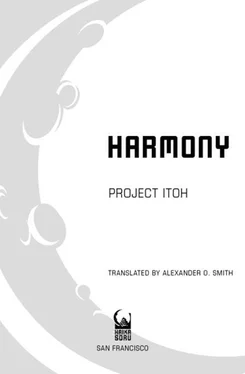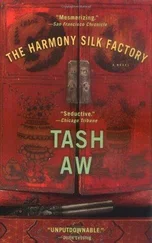Itoh, Project - Harmony
Здесь есть возможность читать онлайн «Itoh, Project - Harmony» весь текст электронной книги совершенно бесплатно (целиком полную версию без сокращений). В некоторых случаях можно слушать аудио, скачать через торрент в формате fb2 и присутствует краткое содержание. Год выпуска: 2010, Издательство: Haikasoru/VIZ Media, Жанр: Старинная литература, на английском языке. Описание произведения, (предисловие) а так же отзывы посетителей доступны на портале библиотеки ЛибКат.
- Название:Harmony
- Автор:
- Издательство:Haikasoru/VIZ Media
- Жанр:
- Год:2010
- ISBN:нет данных
- Рейтинг книги:4.33 / 5. Голосов: 3
-
Избранное:Добавить в избранное
- Отзывы:
-
Ваша оценка:
- 80
- 1
- 2
- 3
- 4
- 5
Harmony: краткое содержание, описание и аннотация
Предлагаем к чтению аннотацию, описание, краткое содержание или предисловие (зависит от того, что написал сам автор книги «Harmony»). Если вы не нашли необходимую информацию о книге — напишите в комментариях, мы постараемся отыскать её.
Harmony — читать онлайн бесплатно полную книгу (весь текст) целиком
Ниже представлен текст книги, разбитый по страницам. Система сохранения места последней прочитанной страницы, позволяет с удобством читать онлайн бесплатно книгу «Harmony», без необходимости каждый раз заново искать на чём Вы остановились. Поставьте закладку, и сможете в любой момент перейти на страницу, на которой закончили чтение.
Интервал:
Закладка:
“That’s just what I want to talk to you about,” Vashlov said, his words cool and measured. “Just let me go with you and talk to you on the way to the airport. That’s all I ask. I won’t slow you down.”
After a moment’s hesitation I nodded, and Vashlov told his own car to go home on its own. I got in and set the route, which brought up a display of the predicted time it would take to get to the airport.
“You’ve got one hour,” I told him.
“More than enough,” Vashlov said, getting in next to me.
Something didn’t feel right as we drove through the city streets. Maybe it was the heavy clouds overhead, but something seemed to have added a generous dollop of loneliness to the flat landscape of the city. I stared out the window, trying to dig the source of that loneliness out of the passing scenery with my eyes. I was no more enlightened by the time the car reached the entrance to the expressway and we left the streets behind.
Even the expressway seemed unusually vacant that day. What is it? I wondered.
It’s you. You’re lonely, the loneliness answered me.
“With this little traffic, we might get there early,” Vashlov said. Then more quietly he added, “They’re all afraid, you know.”
“Of what?”
“Of someone dying right in front of their eyes. Afraid it might be them.”
That made sense.
I’d heard the therapists were overwhelmed.
How could someone just die, right in front of you?
Forced belief in others was what kept our society running. That was what it meant to take a little bit of everyone around you hostage. In exchange for lives that, save for rare accidents, would never end before their time, we were expected to always keep personal information on display, to participate in admedistration discussions and morality sessions, and to make decisions only after receiving advice from the appropriate expert.
But the gears in the clockwork had warped a little bit after the suicides. Though it had happened in a strange way, the “incident” as people were calling it had reminded them of an old familiar feeling—that others were strangers . That they were unpredictable and often distasteful.
True enough. If normally stable people were capable of committing suicide at the drop of a hat, it was impossible to know whom you could trust. What would happen if they took their own lives the very moment you did decide to trust them? What would that do to you?
I knew what it had done to me. Eternity had crumbled.
We all knew that people were supposed to live for a hundred some-odd years, without ever getting sick or seeing anything troubling. The world was supposed to be a gentle place. A safe place.
The illusion had just been smashed to pieces.
What would happen next?
Perhaps imprudently, I was wondering that too. Surely, the suicides hadn’t been the end of it. This had to be part of somebody’s plan—maybe even a still-alive Miach Mihie’s plan. The ones who had committed suicide were simply the first sacrifices that had to be made so that the plan could be put into action.
“Aren’t you scared?” I asked the Interpol agent.
“Of course I am,” he answered calmly.
“What did you want to talk to me about?”
Vashlov shrugged and began. “It was, I think, about a year ago when my section of Interpol began investigating a certain group. The group consists of powerful elders in various admedistrations and the heads of certain medical industrial collectives, as well as a few scholars and scientists. They were researching ways to improperly access people’s WatchMe and medcare units in order to activate a certain technology during crises.”
“What kind of technology?”
“We’re not entirely sure yet. All we know is that they are able to use the admedistration WatchMe servers to access people’s bodies directly. That, and their ideology reflects strong memories of the Maelstrom.”
The Maelstrom—the years of chaos and mushroom clouds that had opened mankind’s eyes to its true nature and inspired our current lifeist society.
“They—these old people—are afraid that humanity will once again fall into the chaos of those years. There are plenty of theories as to why the Maelstrom happened, but one thing it did prove was that our brains are capable of reverting to barbarism with shocking alacrity. And it only took tens of millions of people to die to prove it. Which is why they moved to put all of humanity under observation—through WatchMe. They call themselves the Next-Gen Human Behavior Monitoring Group.”
I had to collect my thoughts for a moment to process this story of megalomaniacal conspiracy. The man had Interpol ID, and he didn’t seem delusional—it was just that the scale of his conspiracy theory was so grand. He was asking me to believe that all human life was basically under the watchful eye of a select group of people.
“There’s no need to give me that look. I’ll show you my Interpol psych evaluation, if you like.”
“I’m just not sure how to take this.” Of all the things I had anticipated this man telling me, a conspiracy theory was not one of them.
“I completely understand, but you’re going to have to believe me. We do not have much time left.”
“You mean there’s going to be another wave of suicides?”
“Or something like that, yes. On the day of the incident, this group performed a test of their system. Just a test, to see if the technology worked as intended. The test was a success—save for an unexpected mass wave of simultaneous suicides.”
“You mean to tell me that was an accident?”
I found it hard to believe that an organization founded on fear of the Maelstrom, no matter how megalomaniacal, would make a technology capable of ending so many lives and causing so much fear. Wasn’t that exactly what they would be trying to prevent?
“No, not an accident. According to our source, there is another group within this group. Though they share the same objectives, they are directly opposed to the larger group on the issue of the means to that end. A rogue faction, if you will.”
“So this ideological rift within the group was the trigger that caused all those deaths?”
“Rather, what we saw was one act in the confrontation between these two groups. The suicides were a power play by the rogue faction, if you will.”
A little office spat among a group of megalomaniacs, resulting in a mountain of corpses.
“Then why bring this to me?” I asked.
“In order to ask for your help, of course. Rather, we want to help you with your investigation. I’ll be frank. There are elements within Interpol that have not taken kindly to the Helix Inspection Agency inserting themselves into the investigation of the incident. There was quite a heated debate about it. The naysayers felt that this was strictly a criminal case, and that WHO, an admedistration monitoring agency, was using the incident as an excuse to make a grab for more authority.”
“They were probably right.”
Stauffenberg was first and foremost among the expansionists. I had once listened to her give a speech in which she claimed that the Helix Inspection Agency, as defenders of lifeism, had an obligation to deal with any and every threat to human lives or health.
“Even still, with what’s happened, and worse to come, cooperation seems to be the only choice. We do not know when they will make the next move. All we know is that we have to stop them before—excuse me.”
Vashlov put a hand to one ear. Someone calling him on his HeadPhone.
Unconsciously, I reached up and rubbed the back of my own scalp.
Right inside here.
Inside the gray matter in my skull.
Some old farts, in their fear of the Maelstrom, had built a little medicule network there for me. Our free will was the last thread of ourselves not yet outsourced. Yet there was a mechanism that could take even that away from me, a mechanism controlled by a group of people that didn’t believe in our society, not that they wanted us to believe in it. If that network suddenly ordered me to kill myself, then I would draw the gun I wore at my side and, without a single conflicting thought, shoot myself in the head. I found myself really wanting to know exactly how it would work when the time came.
Читать дальшеИнтервал:
Закладка:
Похожие книги на «Harmony»
Представляем Вашему вниманию похожие книги на «Harmony» списком для выбора. Мы отобрали схожую по названию и смыслу литературу в надежде предоставить читателям больше вариантов отыскать новые, интересные, ещё непрочитанные произведения.
Обсуждение, отзывы о книге «Harmony» и просто собственные мнения читателей. Оставьте ваши комментарии, напишите, что Вы думаете о произведении, его смысле или главных героях. Укажите что конкретно понравилось, а что нет, и почему Вы так считаете.












